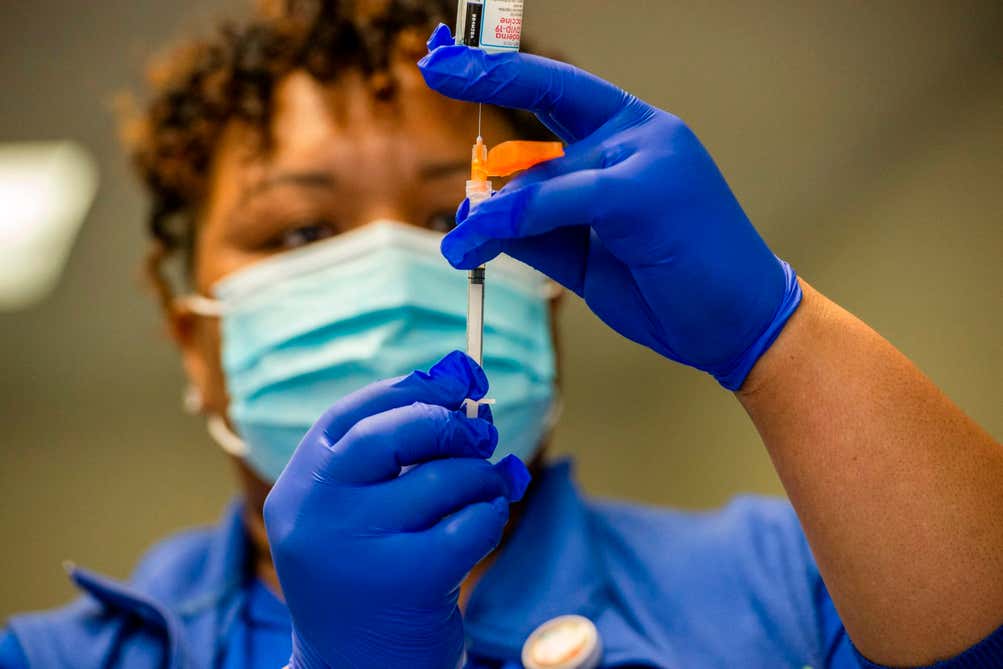A surprising benefit of mRNA COVID-19 vaccines has emerged, with new research indicating they may enhance the immune system’s ability to fight cancer when administered alongside certain immunotherapies. An analysis of patient records at leading U.S. cancer centers suggests that people receiving mRNA COVID-19 vaccines shortly after starting immune checkpoint inhibitors (ICIs) experienced significantly longer survival than those who were not vaccinated within the same timeframe.
The study, led by Dr. Elias Sayour of the University of Florida, examined nearly 1,000 patients undergoing treatment for advanced lung cancer and melanoma. Results showed that patients who received an mRNA COVID-19 vaccine within 100 days of beginning ICIs lived nearly twice as long as their unvaccinated counterparts. For example, among 884 advanced lung cancer patients treated with ICIs at the University of Texas MD Anderson Cancer Center, 180 received the vaccine within the critical 100-day window. Their median survival was approximately 37 months, compared to just 20 months for patients who were not vaccinated. Similarly, melanoma patients showed a survival advantage, with vaccinated individuals reaching 30–40 months versus 27 months for those unvaccinated.
“This is an incredible finding,” said Dr. Sayour. “It raises the possibility of using mRNA vaccines not only to prevent disease but also to enhance the body’s immune response to cancer. The concept of a ‘master key’ mRNA vaccine that could stimulate anti-tumor immunity in all patients is no longer purely theoretical.”
Understanding the Mechanism
Immune checkpoint inhibitors are a breakthrough in cancer therapy, earning their developers the Nobel Prize in 2018. They work by targeting “off switches” on T-cells, the immune system’s main cancer-fighting cells. One key protein, PD-1, acts as an off switch when it binds to PD-L1 on other cells, effectively telling T-cells to stop attacking. Many cancers exploit this mechanism, producing large amounts of PD-L1 to evade the immune system. ICIs block these off switches, allowing T-cells to attack tumors more effectively.
However, the success of ICIs depends on the immune system already recognizing the tumor. If T-cells are not sufficiently activated, the drugs alone have limited impact. This is where vaccines, which stimulate the immune system, could provide a major advantage. Traditionally, cancer vaccines are personalized to target mutations specific to an individual’s tumor, a process that is both costly and time-consuming.
Unexpectedly, Dr. Sayour and his team found that even non-specific mRNA vaccines—originally used as controls in experimental cancer vaccine trials—produced a significant anti-tumor response. These vaccines appear to act as a kind of immune “siren,” mobilizing T-cells and enhancing their ability to attack cancer cells.
COVID-19 Vaccines as an Immune Booster
Given these findings, researchers hypothesized that mRNA COVID-19 vaccines might have a similar effect. Analyses of patients at MD Anderson supported this idea, showing measurable survival benefits when vaccines were administered soon after the start of checkpoint inhibitor therapy. These observations have prompted plans for formal clinical trials to confirm the effects before the end of 2025.
Some case reports had already suggested that mRNA COVID-19 vaccines could trigger tumor shrinkage, even in patients not receiving ICIs. While intriguing, these findings require further investigation to understand the scope and mechanism of the effect.
Caution and Next Steps
Despite the promise, experts urge caution. “We don’t recommend changing clinical practice until these findings are confirmed,” said Dr. Sayour. Vaccines stimulate the immune system, which can carry risks, especially in patients with cancer. Current guidelines for COVID-19 vaccination should continue to be followed.
Nevertheless, the potential is enormous. mRNA vaccine technology, celebrated for its role during the pandemic, could now become a versatile tool in cancer treatment. Funding for mRNA research, however, faces cuts in the U.S., despite the vaccines’ profound benefits both in preventing infectious disease and potentially aiding cancer therapy.
“This research highlights the untapped potential of mRNA technology,” Dr. Sayour added. “We are just scratching the surface of what these vaccines can do beyond COVID-19.”
Implications for Patients
For cancer patients, this research provides hope but also a note of caution. While vaccination may enhance immunotherapy outcomes, it is not yet a substitute for established treatment protocols. Doctors recommend continuing to follow existing vaccine and cancer treatment guidelines until more data is available from ongoing clinical trials.

